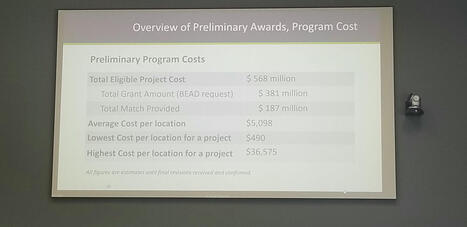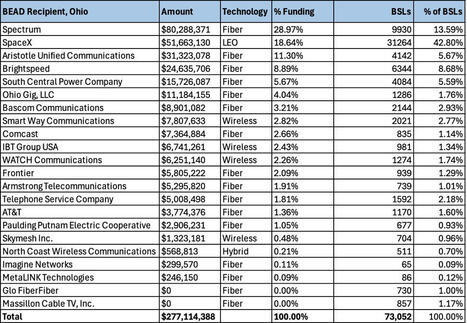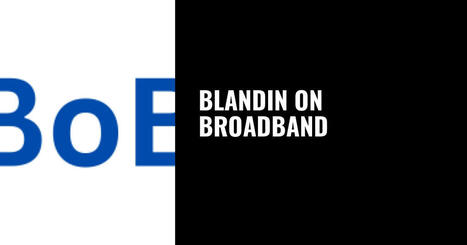 Your new post is loading...
 Your new post is loading...
Sally Doty and her team in Mississippi released its own draft final proposal for BEAD yesterday with a big percentage for fiber. To be more specific, 87% will go to fiber (.5% HFC in there) while 13% goes to LEO and SpaceX.
When reached for comment
- Republicans have accused tech platforms of suppressing conservative views
- Tech platforms deny claims
- FTC chair's letter warns Google may face probe if it violates regulations
"My understanding from recent reporting is that Gmail's spam filters routinely block messages from reaching consumers when those messages come from Republican senders but fail to block similar messages sent by Democrats," the letter released by the FTC said.
I’ve been increasingly hearing about local governments installing flood sensors as a way to alert the public about high-water situations. There seems to be an increasing number of major flooding events in the news, like Hurricane Hellene last year and the Guadalupe River floods earlier this summer. But there are numerous smaller flooding events all…
- A whistleblower alleges the Department of Government Efficiency (DOGE) stored sensitive Social Security data on a vulnerable cloud server.
- The complaint claims the server lacks sufficient security measures and access tracking, potentially exposing personal information of over 300 million Americans.
- The complaint cites potential violations of Social Security protocols and federal privacy laws.
New assertions against DOGE claim that the organization is putting the personal information of more than 300 million Americans at risk of being leaked or hacked. A whistleblower complaint against the Department of Government Efficiency alleges that the organization uploaded a sensitive Social Security database to a vulnerable cloud server, thereby putting information required to receive Social Security benefits at risk. Lawyers for chief data officer Charles Borges alleged in an Aug. 26 complaint that DOGE's actions have created "a live copy of the entire country’s Social Security information." The complaint further states that the information is stored on a server that lacks adequate security oversight and a means to track who has accessed the data.
Today I attended an in-person version of the MN Office of Broadband Development Update: BEAD Final Proposal and upcoming meeting held yesterday. For the PPTs and great detail, I recommend you check yesterday’s post. Today I just took note of update and questions from the attendees. There weren’t many of us there, but it is…
This is what massive deregulation looks like — Burdens and harms have been placed on the public, which we will be detailing in the next few stories. Let me explain: Click headline to read more--
The company has been facing a federal jury this week in California, around a class action suit that claims between 2016 and 2024, Google saved and used “pseudonymous” information about its users without consent. Despite customers opting out of data collection on Google services, the lawsuit alleges that Google still accessed their data collected via third-party apps. How? Google tapped the data tracked by its own analytics software incorporated inside these apps. (Google did not respond to a request for comment by the time of publication.) Explained like that, it seems almost obvious that Google could be privy to data. But of course, most users have no idea what analytics software their apps are using, and furthermore, plaintiffs argue that 98 million people opted out of Google having their third-party data collected. They believed they were covered, even if there were some other hidden terms and conditions offered by individual apps.
Despite his past criticisms of the data privacy risks associated with ‘smart’ technology, Kennedy’s HHS is now pushing wearables on Americans. Experts say the privacy concerns are jarring.
Funding from the W.K. Kellogg Foundation fuels our momentum to shape a capital system that delivers affordable, high-speed internet for all communities
Some investors are not happy that Intel agreed to sell the US a 10 percent stake in the company after Donald Trump attacked Intel CEO Lip-Bu Tan with a demand to resign. After Intel accepted the deal at a meeting with the president, it alarmed some investors when Trump boasted that his pressure campaign worked, claiming Tan "walked in wanting to keep his job, and he ended up giving us $10 billion for the United States." "It sets a bad precedent if the president can just take 10 percent of a company by threatening the CEO," James McRitchie, a private investor and shareholder activist in California who owns Intel shares, told Reuters. To McRitchie, Tan's acceptance of the deal effectively sent the message that "we love Trump, we don't want 10 percent of our company taken away."
Network attacks are disrupting daily life and emergency services. Explore why they’re happening and the urgent need for stronger protections.
BRADFORD COUNTY, N.Y. (WETM) — Pennsylvania State Representatives Tina Pickett (R-Bradford/Wyoming) and Clint Owlett (R-Tioga/Bradford) Office’s have announced in a release that more than $73 million is set to be given to Bradford County for better internet access. More than $73 million will be given to Bradford County in broadband access funding through Broadband Equity, Access and Deployment (BEAD) program grants, the release said. The program, BEAD, looks to help residents and businesses get better access to affordable high-speed internet through broadband planning, deployment, mapping, equity, and adoption activities, investments, the release emphasized.
New York State this week announced $52.6 million in broadband infrastructure awards, including funding for two local projects aimed at expanding internet access in affordable housing. - Geneva (Ontario County) – $203,663: Community Broadband Networks will bring hybrid fiber-fixed wireless service to affordable and public housing, offering $10/month service and $30/month gigabit speeds for at least 10 years.
- Greater Ithaca (Tompkins County) – $1,012,456: Community Broadband Networks will provide the same service to affordable and public housing properties in the Greater Ithaca area.
|
Ohio also dropped its draft final proposal yesterday afternoon, distributing 50% to Fiber/HFC, 7% wireless, and 43% LEO. OhioBroadband chief, Peter Voderberg, tells me that These numbers may change slightly as we finalize some of the locations tha
Today, Federal Trade Commission Chairman Andrew N. Ferguson issued a letter to Alphabet, Inc. CEO Sundar Pichai regarding potential FTC Act violations related to partisan administration of Gmail. The letter addresses reporting that Gmail uses partisan methods to determine which emails are flagged as spam, and reminds Alphabet of its obligations under the FTC Act.
The company is appealing a Fourth Circuit ruling that said Cox could be found partially liable for its customers pirating music.
Elon Musk’s team of young DOGE disruptors have been unmasked, much to the ire of the billionaire and other MAGA figures. One is a 19-year-old college freshman and heir to a popcorn fortune. Another was hosting Model UN sessions in 2019 and a third was given money by his parents to invest in stocks while at his high school in Silicon Valley. The world’s richest man lashed out at an X account which suggested the six young men, who now have access the Treasury Department’s payment system, among other things, should be “paid a visit” by FBI agents. “You have committed a crime,” Musk fired back at a comment from the account Monday, shortly before the post in question was removed for allegedly violating the platform’s rules. Musk appeared to soften his stance on the men being identified later Monday, writing it was “time to confess” that the “media reports saying that @DOGE has some of world’s best software engineers are in fact true.” But he was wrong—not all the group are even “software engineers.” Three do not even have degrees. And one who does is trying to cash in on his new job by charging people to read his Substack entry which boasts, “Why DOGE: Why I gave up a seven-figure salary to save America.”
One of the great pleasures of working at Free Press is getting to chop it up with Joseph Torres on a regular basis. Thanks to our friends at the media-watchdog group FAIR, everyone now has a chance to hear Joe’s insights. FAIR’s Janine Jackson recently interviewed Joe on Counterspin, her nationally syndicated radio show. As Free Press’ senior advisor on reparative policy and programs — and the co-founder of the Media 2070 project — Joe has long explored the intersection of race and the media. As Janine reminds us in her introduction to the interview: “Donald Trump didn’t invent bad, racist, anti-democracy media, or the legal landscape that allows it to thrive. As on other issues, there’s a history to understand and contend with if we’re serious about the goal of growing responsive, inclusive, intelligent news. And that history includes hope, as well as a lot of harm, much like the country itself.” We’re grateful to FAIR for allowing us to publish this condensed and edited version of the interview transcript here at Pressing Issues. (You can listen to the full interview here.)
On August 19, 2025, West Virginia released its revised Final Proposal for the Broadband Equity Access and Deployment (BEAD) Program. The West Virginia Office of Broadband recommends awarding $625 million in BEAD funding to deploy broadband infrastructure to 73,701 eligible locations. Of those locations, 94.2 percent would be served by fiber to the premises and 5.8 percent by low-earth orbit (LEO) satellite. In March 2025, West Virginia withdrew its original draft Final Proposal for the BEAD Program, hinting that forthcoming rules changes from the National Telecommunications and Information Administration (NTIA) would necessitate substantial revisions to the plan. Indeed, on June 6th, the NTIA released rule changes that fundamentally restructured the BEAD program. Since then, West Virginia, like all other states, has re-run its BEAD program under the new rules. Comparing West Virginia’s two “final” proposals reveals some key differences and demonstrates an enduring commitment to bring the best broadband infrastructure possible to all residents.
The new BEAD guidance says that subgrantees must propose at least one low-cost broadband option that meets NTIA approval.
OpenAI has authorized itself to call law enforcement if users say threatening enough things when talking to ChatGPT.
In a rare move, ever heard of a state actually returning hundreds of millions of dollars it didn't spend on a government-funded project? It's in Oklahoma where Oklahoma Broadband Office director Mike Sanders says that with the state soon to have 95% connectivity with broadband, his office will be $225 million under budget. “We were given a budget initially from the Biden Administration, which was only an estimate. So, keep that in mind. Oklahoma was never given a blank check contrary to what noise is out there,” he said in a recent interview with an Oklahoma City TV station.
U.S. Immigration and Customs Enforcement (ICE) has partnered with Palantir Technologies—a Denver-based software company co-founded by billionaire entrepreneur Peter Thiel—to use artificial intelligence and data mining to identify, track, and deport suspected noncitizens. Palantir is slated to deliver a prototype of the ImmigrationOS platform by September 25, 2025, with the contract running through September 2027. ICE is paying Palantir $30 million for the platform. Similar to Palantir’s other systems, ImmigrationOS will pull together vast amounts of data, detect patterns, and flag individuals who meet certain criteria, raising concerns about potential impacts on civil liberties in America. Those concerns are amplified by the revelation that Stephen Miller, the Trump administration’s chief architect of immigration policy, holds a substantial financial stake in Palantir—underscoring the potential conflicts of interest in the government’s embrace of the company’s technology. The plan, first reported by Business Insider, has triggered lawsuits from privacy and labor rights advocates and raises serious concerns about accuracy, justice, and civil rights.
From the Office of Broadband Development... The Minnesota Department of Employment and Economic Development (DEED) today released the state’s draft final proposal for using federal Broadband Equity, Access, and Deployment (BEAD) Program funds to expand broadband availability. The proposal would extend broadband access to 75,000 Minnesota homes and businesses, covering every location eligible for BEAD…
A lot of activity from the MN Office of Broadband Development today, much of what I'm posting is duplicative today but it's nice to have each communication for the archive. Also, it's been a busy summer (and beyond) for the staff and these are the products of that hard work... Broadband Matters: Office of Broadband…
|




 Your new post is loading...
Your new post is loading...
























